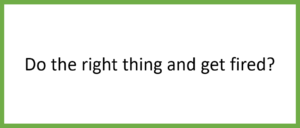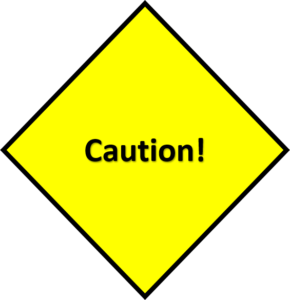Archive for August, 2016
Your Ethics Can Get You Fired
 Maintaining a positive reputation at work means that sometimes you don’t speak up when something’s wrong. We all know the sayings, “don’t rock the boat” and “pick your battles.” When the issue goes beyond a gray area, or a slight bending of the rules of the employee handbook, you’re in a tough position.
Maintaining a positive reputation at work means that sometimes you don’t speak up when something’s wrong. We all know the sayings, “don’t rock the boat” and “pick your battles.” When the issue goes beyond a gray area, or a slight bending of the rules of the employee handbook, you’re in a tough position.
Several years ago I had a conversation with two mid-career lawyers about sexual harassment in the workplace. Both of them said that they would not tell their firm’s HR department or file a complaint if they were sexually harassed. They were sure that they would be fired in retaliation and black balled in the legal community, preventing them from getting a new job in their field.
I asked what they thought about the moral obligation to report issues like this. Because if nobody takes a stand against harassment and discrimination crimes, then they will keep happening, both to the current victim and others. The two lawyers didn’t hesitate to say they wouldn’t ruin their careers over it.
Over the years I’ve heard many variations of that conversation, but this stood out because the people were lawyers. They understand the law, their rights, and the process to seek justice if wrongfully terminated.
They also understood the personal consequences of reporting a crime and decided it isn’t worth it.
That’s bleak, and probably why we admire some whistleblowers who expose large scale crimes in their workplaces. Calling out illegal activity is a huge personal risk. Up until the point when whistleblowers are national heroes talked about in the media, they might be considered by their company’s peers and managers to be rats, tattlers, trouble makers, whiners, complainers, and ungrateful losers who should have been happy they had jobs in the first place.
They might be called all of those things and also be freshly unemployed. With a bad reputation that makes it difficult to be hired elsewhere.
Other people told me stories about being instructed by their managers to lie to investigators about crimes they witnessed. One man admitted that he lied under oath in trial court because his supervisor demanded that he do so or else lose his job.
Where do you draw the line between self-preservation and ethics?
I’m guessing most of us think we would make the ethical choice if we were in situations like that. But when people are actually in a position to lose their livelihoods, I doubt it is such an obvious decision.
I’m glad there are some people brave enough to sacrifice their personal wellbeing to stand up to workplace crimes.


Recent Comments